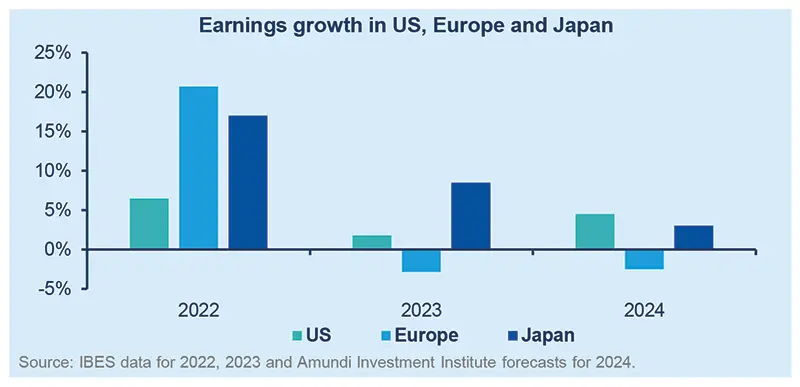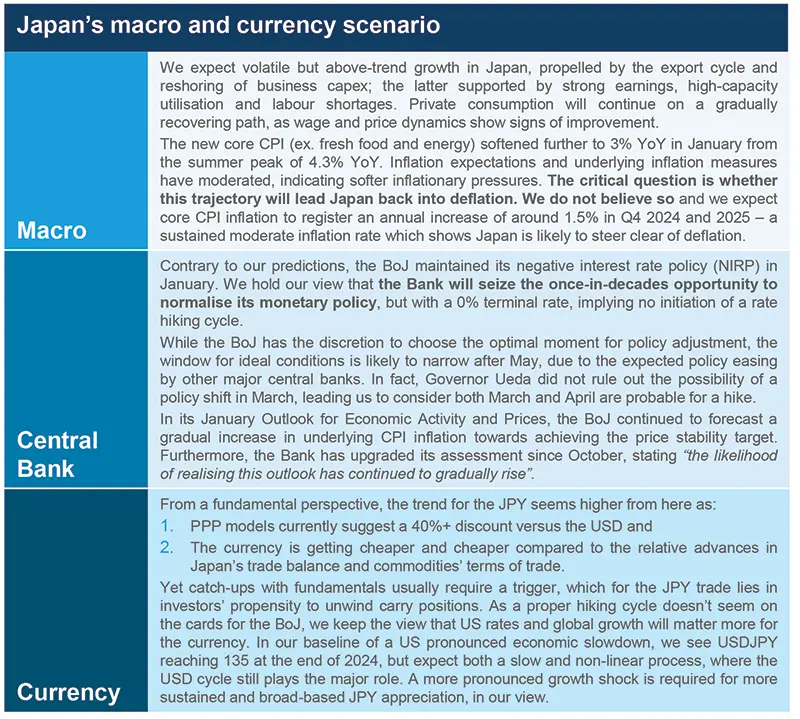Summary
Key Takeways
Three key arguments support the Japanese market:
1) a recovery in profits;
2) a strong incentive from the Tokyo Stock Exchange for companies to improve their capital efficiency; and
3) the shift out of deflation is boosting a market rerating. Risks to these positive arguments are mostly linked to the Yen, especially if it were to rise. Not hedging the Yen in 2024 could therefore be an attractive option.
Japan is in the middle of a rerating process, even if not without risks.
Japan’s ongoing equity revival
Japan’s equity market is at a historical high in total return terms and in price return terms it is at its highest level in almost 34 years. It was one of the top performers in 2023. The TOPIX (Tokyo Stock Price Index) gained +25% compared to +20% of the MSCI ACWI. This robust performance is unlikely to be replicated with the same strength in 2024, but the outlook for the market remains favourable.
The arguments supporting a positive stance still seem credible to us:
▪ Firstly, earnings growth in Japan’s market remains attractive.
It was higher than that of the US market in 2022 and 2023, and was less volatile than that of Europe. For 2024, the Ibes consensus forecast at +7.6% is less than that for the MSCI ACWI (+10%), but unlike for the other markets (notably the Pacific excluding Japan), its forecast for the TOPIX is regularly revised upwards. The 6.9% average fall in the Yen versus the US Dollar in 2023 was a positive factor behind market performance, which will be difficult to replicate in 2024 and justifies lower earnings growth than in 2023. In addition, Domestic Demand is proving lacklustre, either in Households Consumptions or Private Capex, as reported in the preliminary 2023 Q4 GDP release. Recovery ahead is moderate, with inflation only slowly decelerating and gradually increasing Households pricing power. Meanwhile, global growth should slow further (+2.4% in 2024 compared to +3.1% in 2023).
▪ Secondly, the reforms introduced by the TSE (Tokyo Stock Exchange) in March 2023 will continue to produce positive effects in 2024. The aim is to encourage companies with a P/BV (price-to-book ratio) of less than 1x (43% of companies had a P/BV lower than 1x versus 5% in the US and 24% in the EU, according to TSE’s calculation) to implement measures to improve this by March 2025. In other words, returns on equity should increase and not only through buybacks.

In mid-January 2024, the TSE published the names of the 660 companies that have already taken action, which should encourage them to continue and others to follow.
▪ Lastly, the Japanese market should continue its rerating. By definition, the TSE reform works in favour of market rerating. The end of the deflationary environment, which has long penalised the equilibrium levels of Japanese P/Es, has been a key underlying factor in performance in 2023 (77% contribution to the total return performance of the MSCI Japan). The market's P/E has now returned to its average of the last 12 years, at around 14x 12-month forward earnings. Wage negotiations in the spring should lead to wage rises for the second year running and that should be sufficient to confirm a scenario of an end to deflation and confirm the market's continued rerating above its average of recent years.
The risks to these positive arguments are mostly linked to the Yen. A strong comeback by the Yen, should global equity volatility increase sufficiently in 2024 to encourage the unwinding of carry trades, would weigh on the performance of Japan’s equities in local currency. It would penalise profits and, everything else being equal, slow the process of increasing inflation, weighing on valuations at the same time. For international equity investors, not hedging the Yen in 2024 could thus be an attractive option.







